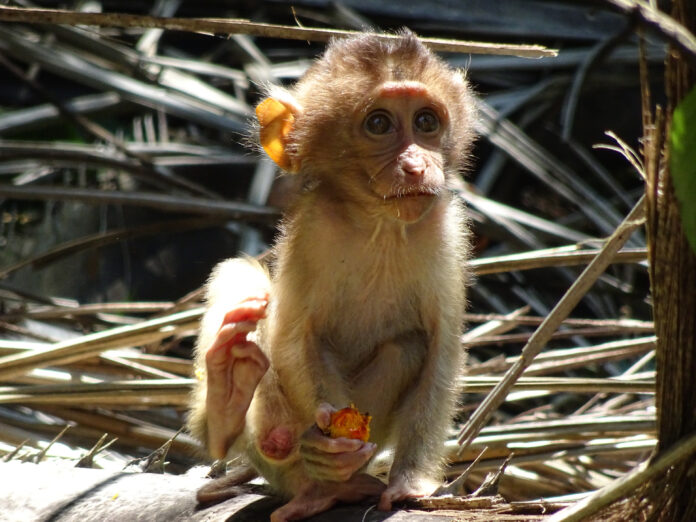Baby monkeys are dying because of the effects of palm oil plantations, researchers have discovered.
And it is not just coming into contact with humans that is the problem. Harmful agricultural chemicals used in these plantations have also been shown to negatively affect monkeys’ development.
Plantations are used to grow the oil palm tree, which is used to produce palm oil. This is found in food products, cosmetics, detergents and to a small extent biofuel. Over half of all packaged products Americans consume contain palm oil, according to the World Wildlife Fund (WWF).
The oil palm tree can only be grown in the tropics but plantations can cause major issues for native wildlife.
Anna Holzner
A decade-long study by the Universiti Sains Malaysia (USM), the German Centre for Integrative Biodiversity Research (iDiv), Leipzig University (UL), and the Max Planck Institute for Evolutionary Anthropology (MPI EVA), studied palm plantation sites, and the direct impact they had on the southern pig-tailed macaque monkey, which is native to peninsular Malaysia.
Over ten years, researchers discovered that 57 percent of macaques born between 2014 and 2023 died before they were even a year old.
This is a much higher death rate than for other wild primate populations, the study reported. Two groups of macaques living in a rainforest habitat intertwined with palm plantations were studied over the ten-year period.
Baby monkeys that had more exposure to the plantations were three times as likely to die early.
The high death rates are the result of a number of factors. One is monkeys’ exposure to feral dog packs that roam the plantations and prey on them, Dr. Nadine Ruppert from USM said in a press release on the findings. Humans also sometimes capture the monkeys and keep them as illegal pets.
Another problem is the long-term effects of agricultural chemicals and pesticides that are used to “manage the monocultures on mammalian wildlife.” These are very poorly understood, Ruppert said.
The high number of deaths in this region could be hugely detrimental to the wider macaque population.
Palm oil plantations have always been problematic. Although they can increase easy access to food, they frequently have a detrimental effect on native wildlife.
The global demand for palm oil has led to the proliferation of plantations across Asia, Africa and South America. But the increasing number of plantations has resulted in the destruction of tropical forests.
Macaques are not the only species at risk from such habitat degradation. Virtually every species that relies on tropical forests for habitat and food, which can often include humans, are affected.
“The literature suggests that certain harmful substances used in agriculture can cross the placental barrier and be passed on to the unborn offspring. We also know that certain fat-soluble molecules can be passed on through breastmilk,” lead author Dr. Anna Holzner from iDiv said in a press release. “Accordingly, the longer the chemicals accumulate in the mother’s body, the more they could influence foetal development during pregnancy and also during lactation.”
The findings elevate the need to focus on the threats posed to wildlife by these plantations. The next step is to analyze the chemicals used in such plantations and how exactly they are affecting a species, senior author Anja Widdig said.
“We know that the use of pesticides in agriculture has led to drastic declines in insect populations, so chemical analysis is essential to understand the effects of pesticides on mammalian wildlife,” Widdig said. “Our findings underscore the critical need to implement environmentally friendly cultivation practices that minimise the risks to wildlife populations and also to people living near plantations.”
Do you have a tip on a science story that Newsweek should be covering? Do you have a question about macaques? Let us know via [email protected].
Uncommon Knowledge
Newsweek is committed to challenging conventional wisdom and finding connections in the search for common ground.
Newsweek is committed to challenging conventional wisdom and finding connections in the search for common ground.


